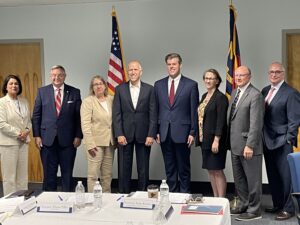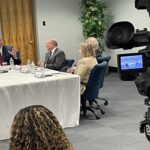
RALEIGH — Senator Thom Tillis (R-NC), NCMS Member Representative Dr. Timothy Reeder (R-District 9), and NCMS Member Dr. Robyn Jordan joined other physicians and state officials Monday to discuss substance use and mental health.
In a wide-ranging discussion, panelists talked about everything from the stigma associated with mental health and substance use disorder, to hurdles stakeholders see every day, to the need for permanence of telehealth as a treatment option.
When talking about the stigma surrounding mental health and substance use, Tillis recounted his personal story of a brief time he battled anxiety and depression and the push-back he got from colleagues about being open about his journey. Reeder says he has “seen it first hand” as a physician and knows how difficult it makes treating patients in the ED.
Many on the panel stressed how difficult it can be to help patients get and maintain help, with Jordan saying one of her main goals is “to make sure everyone has access to care.”
Tillis added that younger patients have a better understanding of mental health as part of overall health, but that the older generations still struggle.
When it comes to hurdles, several issues arose including payor issues, gaps in coverage, pharmacies who won’t fill some prescriptions, and a general lack of healthcare coverage across the state. Nearly a third (31) of North Carolina counties have no psychiatric care available.
To combat some of those hurdles, the panel was in agreement on the importance of telehealth. Jordan says telehealth “changed how we do everything! It allows us to see people in their home environment rather than an office and helps evaluate how well they are managing their care. ”
“If telehealth was removed,” Jordan says, “it would be devastating.”
Steve Lawler of the North Carolina Healthcare Association says that telehealth “is a best practice now and gets the best care possible to our (NC) communities.”
Tillis also stressed the importance of and success of the Bipartisan Safer Communities Act (BISCA), which was passed one year ago. Among the funding allotted through the act is $1 billion for the Stronger Connections Grant Program, $500 million for the School-Based Mental Health Services Grant, $250 million for the Community Mental Health Services Block Grant, and $150 million for the National Suicide Prevention Lifeline.
To read more on BISCA click here.
Here are some photos from the event:






